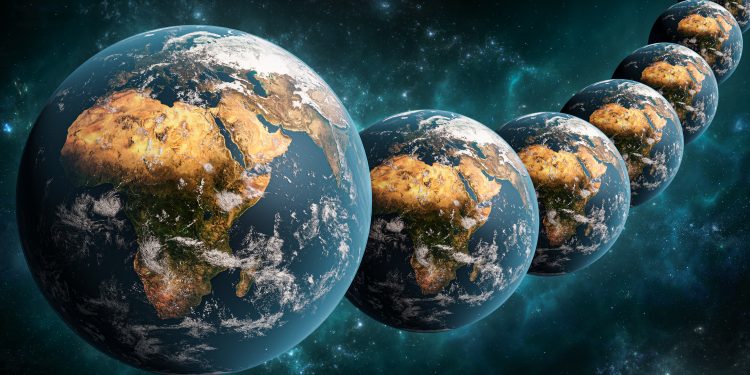To simplify the many definitions of ‘universe’, we can say that it is a term that unifies all existing matter and space (also known as the cosmos) – which means that technically speaking, there can only be one universe.
However, there is another broader way to look at the term, which perceives the universe as ‘everything we shall ever see’ or ‘regions of time and space that can exist and expand together’. By the latter definition, Marvel’s Dr. Strange and your other favorite sci-fi shows might be on to something, and we can indeed be living in the multiverses of madness or parallel universes.
In this article, let’s look at some of the reasons why it might be possible for all multiverses to coexist and why we might be living in one of them:
The universe is too immense to rule out the possibility of the multiverse
The sheer vastness of the universe is what makes the possibility of a multiverse all the more plausible. Since we already deem the universe to be infinite in size (which continues to expand), who’s to say that parallel reality isn’t just further beyond our reach?
Scientists have estimated that some 13.7 billion years ago, as per the big bang theory, the universe exploded to 10^26 times its original size through cosmic inflation.
After the inflation slowed, matter and radiation were formed to create the big bang fireball, which led to the creation of the stars and galaxies that populated the space surrounding earth. However, inflation hasn’t slowed everywhere and is ongoing in other places, where it may have formed other universes under the same phenomenon.
It could be an explanation for the beginning and end of physical reality
Human brains are designed to think that everything must have a clear start and a clear end. So, if the big bang was the start of our universe, how would it end?
The multiverse concept can answer that because, as per the scientists, the multiverse contains braneworlds – a term used to define infinite realms that exist beyond our perceived three dimensions, plus the dimension of time that governs our own braneworld.
If these hypothetical braneworlds bump against each other (which will be a rare occasion), they can cause repeated big bangs and cause universes to start over and over again.
It can finally resolve the conundrum of time-travel
Time travel makes for some really great fictional content like Back to the Future, Terminator, Avengers: The End Game, Groundhog Day, Time Traveler’s Wife, and The Outlander. However, the many interpretations have birthed debates about the technicalities as exemplified by the Grandfather Paradox.
Another major conflict of time travel is that if we suppose that everything that’s supposed to happen has already happened, it nullifies the whole theory. Like even if someone did go back in time to change the future, it was already supposed to be that way, and the result would be as it was always supposed to be.
Or you can argue that someone can go back in the past to change the present world, then the past will technically become present and create a whole new timeline for the future.
(It’s a bit mind-bending, however, if you are still upset about how Captain America’s conclusion in The Endgame, you know what I am talking about!)
The concept of the multiverse will resolve all these debates because it hypothesizes that everything that could happen is already happening in other realities with their own timelines.
Multiverse exists. Because why not?
As bizarre as it sounds, one of the most widely-used arguments in favor of the existence of a multiverse could very well be; why not?
It complements the evolution of the knowledge amongst humans who started out believing that the earth was the center of everything and was flat.
Later, we learned that the sun is also a star and that other planets have multiple moons, leading us to realize that we are only a smart part of an unimaginably vast universe that we might never be able to study in its entirety. So, can we not postulate that years from now, scientists may be able to actually prove the theory and uncover the mystery of the multiverse’s existence?
The Quantum Physics factor
Quantum mechanics studies reality functions at a microscopic level, revealing that elementary particles like electrons exist in various locations, orientations, and velocities.
However, at a macroscopic level, objects appear to exist in a single state at a time. With an idea to project the same principle on a gigantic level, Hugh Everett (a 1957 Princeton graduate) came up with the idea of the multiverse where all possibilities dictated by quantum mechanics can exist at once in all different realms existing beyond the perceivable world.
The idea of the Multiverse is supported by religions around the world
For hundreds of years, the idea of the multiverse has been around in the context of religions.
Ancient Greek and Indian religious texts have descriptions of multiple universes. These descriptions were linked with God’s omnipotent powers.
In fact, many dissenting voices in the world of science claim that the multiverse is a religious phenomenon and not a scientific one.
The people who favor this claim argue that since science doesn’t provide any solid backing for the theory, the idea of the multiverse is then synonymous with the claim that God exists. The skeptics maintain that believing in something without verifiable data is like believing in an invisible higher power.
An explanation of the world’s perfection
Funnily enough, the multiverse theory also has backing from atheists. The ancient Atomist philosophers mulled the idea of multiple universes some 2,500 years ago to explain the perfect patterns of the world.
To essentially eliminate the idea of a god that can make everything so perfect, they stated that our world was just one of an infinite number of worlds that look completely different and that all of them were the result of a series of random accidents of particles colliding with each other. To put it in the words of the cosmologist Bernard Carr: “If you don’t want God, you’d better have a multiverse.”
The role of mathematics?
One could debate that mathematics is a construct that humans created to describe various universe patterns. By that logic, it cannot be the actual essence of how the universe works. There might be other systems or structures that work for the other universes.
Another way to look at it is that the universality of math would suggest that the structure of math exists regardless of its acknowledgment, and by that same logic, other universes may exist regardless of anyone having experienced them.
An explanation for the Higgs Boson particle’s lighter mass
If you are familiar with the Higgs Boson particle and all the unanswered questions attached to it, you will be excited to learn that the multiverse can pose an explanation for why it is lighter than its supposed mass of 125 gigaelectronvolts.
If we assume that in each parallel universe, Higgs Boson has its own unique mass value, we can summarize that ours is just a new universe with the lightest mass of the particle that managed to live through the cataclysm associated with the big bang.
New research that hints at the existence of another universe
Physicists from Maryland recently published a paper on bilayer graphene and moiré gravity, where they explored the idea that our reality is just half of a couple of interactive worlds.
The mathematical model chosen by the researchers for studying the behavior of the stacked graphene sheets provides an explanation for why the universe inflates the way it does and how that’s linked to the infinitesimal lengths allowed in quantum mechanics.
Before we part…
A lot of science favors and dismisses the whole idea of parallel universes. Many brilliant brains of past and present have presented their theories and explanations for either side. However, since both sides haven’t been able to prove or disprove this mind-bending phenomenon, we’ll have to content ourselves with debates and Hollywood interpretations.
As for my two cents, I believe that this theory makes people excited because the very idea that there can be a world where life is perfect, better, or never-ending is hopeful. There are worlds where Schrodinger’s cat will definitely be alive. Do you agree?











